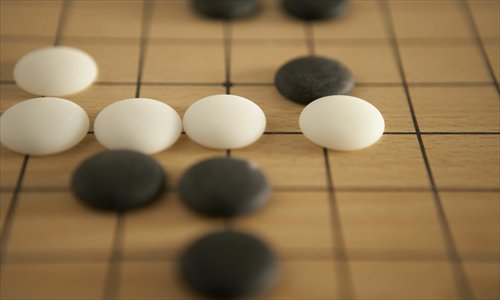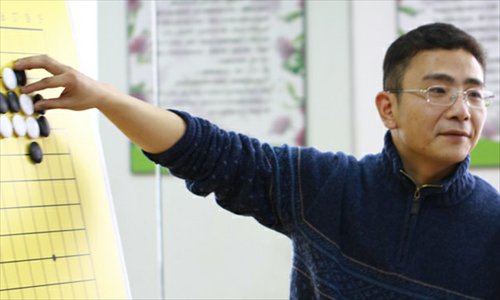Hearts of black and white
In Stanley Kubrick's 2001: A Space Odyssey (1968), the super computer HAL easily checkmates astronaut Frank Poole. In real life, the victory of machine over man came true in 1997, when Deep Blue defeated chess world champion Garry Kasparov.
But unlike in chess, where computers can vanquish even the best human players, in Go, the best computer programs only reach the level of a good amateur. The reason is not simply mathematical (as the calculations involved are substantially more complicated than chess), but also very human, since certain choices are not purely logical but also intuitive.

Photo: IC
Originating in ancient China around 600 BC, Go was introduced to Korea and Japan in the 5th and 7th centuries AD, respectively. The English name Go, along with much of the game's jargon, comes from Japanese. The Chinese refer to Go as weiqi, literally "encircling game," since the aim is to occupy more board space than your opponent by surrounding, and thus eliminating, his or her stones. Extremely complicated strategies are invented for this purpose. While the rules of Go seem simple, the strategies take years to learn.
Although it is played around the world, the game is still most popular in East Asian countries. "Once there was a three-kingdom situation and China was actually weaker compared to Japan and South Korea in modern Go games," Liu Shizhen, the Dean of Shanghai Go Academy and the coach of Shanghai's professional Go team, said. "But Japan is now basically out of the game. The Japanese stopped holding international games since Japanese players were doomed to lose. China dominates the game now, judging from 2013, in which every championship was won by Chinese players," Liu added.
According to Liu, the magic hand controlling the situation is none other than the market. In China, Go is a profitable business; it is less so in South Korea, and no longer the case in Japan. "In South Korea, they are very advanced in video game competitions. Young people tend to find it more fun. But in China, video games are regarded by parents as harmful to their children's studies, whereas Go enjoys the prestige of being part of traditional culture," he said with a smile.

Liu Yiyi, a Go coach of three world champions Photos: IC and courtesy of Hu Yuqing
But becoming a professional Go player is harder than most people would imagine. Before the age of five, an aspiring Go master should have already reached the top amateur level. And in the first two years of elementary school, one must make a tough choice between pursuing a normal education or a professional career.
"If you choose to become professional, it's best to go to Beijing, where daochang (specialized Go schools) are located, which are run by the best players in the nation. The cost - not including the cost of renting a house in Beijing and one parent having to give up his or her career - is about 2,000 yuan ($329) a month," Liu told the Global Times. "Only 20 people are admitted as professional players every year. In South Korea, the quota is limited to two."
For those that don't make the cut, one can choose to study Go locally. Qingyi Go Club in Shanghai, for example, has produced three world champions. Two of them, Jiang Weijie and Fan Tingyu, have their photos on the wall, in which they are pictured holding big trophies having collected prize money of $400,000 and 1.5 million yuan respectively.
"The secret is just practice," Liu Yiyi, the coach of the three world champions and co-founder of Qingyi Go Club, said. "Kids from ordinary families, just like my three champion students, are usually better players than kids from rich families. They are willing to suffer more because they have a stronger will to win."
"Kids nowadays are all good players. The competition is brutal. The peak of a professional player is 25. It's too short a career!" Liu sighed.
At the club, the Global Times saw about 30 kids (mostly boys under 12 years old) in the classroom and a dozen parents (mostly moms) waiting at the gate, chatting to each other. They were pleased with their kids' progress; at such a young age, they were all already top-level amateur players (In other words, they are a match for the best Go computer programs). One 5-year-old boy played a perfect game while squirming absent-mindedly on a chair that was too high for his little body.
A mother who was reluctant to reveal her name told the Global Times that she had gone through 20 teachers for her boy, who is now in the fourth grade and is 4 duan (the top level for amateurs is 5 duan). Zhang Jing, another young mother who escorts her daughter (also 4 duan) to the club from Kunshan every Saturday, said that "girls have to work five times harder to reach boys' level," an opinion that was immediately disputed by Zhou Huazhen, another young mother of a girl who also trained in violin and Olympic math.
"One thing good about learning Go is it teaches you how to face failure," Zhou said. All the mothers present heartily agreed with that point.
The parents themselves are perhaps the greatest tacticians of all, weighing the consequences of every possible move to calculate a winning strategy for their children's future.